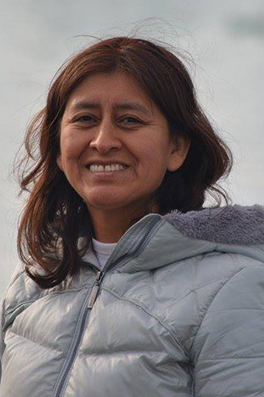About
Dr. Hilaria Cruz is a linguist and a native speaker of the Chatino language spoken in Oaxaca, Mexico, and by members of the Chatino diaspora residing especially in the Southeastern United States including North Carolina, Georgia, and Alabama. There was no writing system for Chatino so as a PhD student, working with two others, Dr. Cruz co-developed a writing system for Chatino. Since then, Dr. Cruz has devoted her professional life to promoting literacy in Chatino. The Chatino Tonal Books Project is one way she has worked to achieve this goal. She has written and published 19 children’s books with her undergraduate and graduate students. She is passionate about creating children’s books in indigenous languages of North America to fill the scarcity of materials in these languages. Dr. Cruz is a board member of the Special Interest Group for Endangered Languages with the Association for Computational Linguistics. She has also been collaborating with computer scientists to further the study of indigenous and endangered languages and the cultural practices associated with these communities.
She teaches Native American religions and linguistics in the Comparative Humanities department at the University of Louisville.
Research interests: San Juan Quiahije Chatino, an endangered Zapotecan language spoken in Oaxaca, Mexico; automatic speech recognition for endangered languages; verb morphology; language documentation; verbal art; language variation
“Reawakening: Reclaiming Chatino Prayers and Political Speech,” a collaborative project facilitated by Dr. Hilaria Cruz and others, was one of the twelve collaborative projects featured at the 2024 Watson Conference. The hybrid project produced collaborative translations of Chatino prayers into English and Spanish.
Speakers of the Chatino language in Oaxaca, Mexico, perform prayers and speeches—composed with parallelism, repetition, and metonymy, typical patterns of pre-Columbian poetic traditions—in all aspects of daily life. The performance and transmission of these art forms are quickly declining due to the migration of youth to Mexican and US cities and because public schools in the region only teach Spanish. Twelve of these prayers were published by anthropologist Carmen Cordero Avendaño de Durand in her 1986 book, “Stina Jo’o Kucha (Our Sacred Father Sun).” The Chatino texts were presented in blocks of texts, written by hand in an orthography that contemporary Chatinos cannot read. Chatino language activists, faculty, and students will come together to translate these Chatino prayers into English and Spanish so that Chatinos can incorporate them in their daily rituals as well as allow larger society a window to these magnificent oral traditions.
Dr. Cruz, Assistant Professor of Linguistics in the Department of Comparative Humanities, co-facilitated the project along with:
- Tuesday Shaw, a third-year student at UofL studying philosophy and humanities with a concentration in cultural studies;
- Dr. Clare Sullivan, Professor of Spanish in the Department of Classical and Modern Languages;
- Cody M. Smith, a third-year student of middle and secondary education and French at UofL;
- María Elena Méndez Cortés, a language activist, writer, and performer of traditional Chatino poetics and prayers from Cieneguilla, San Juan Quiahije, Oaxaca; and
- José Vásquez Canseco, a community activist, musician, and writer from San Juan Quiahije, Oaxaca.
News Articles:
- UofL professor shares endangered language books worldwide, February 21, 2022
- Field Notes Podcast with Hilaria Cruz on Field Linguistics and Chatino May, 2021
- How languages get writing systems: an interview with Dr. Hilaria Cruz (Featured for her work on Chatino orthography in Duolingo)

